Faith groups push Miami-Dade to rescind cuts to food, social service programs
Published in News & Features
At 67 years old, Raimundo “Ray” Ricardo is one of the youngest members of a senior center in Miami Beach — but he still shows up almost every morning.
A retired industrial engineer, he found the Diener Family Center on Española Way about a year ago when he sat down for a free lunch. Now the Miami Beach native is a regular member and a volunteer, organizing activities like domino tournaments for other seniors — many of whom are reliant not only on the daily meals but the community and friendships fostered at the center.
“I get to meet a lot of people here that, financially, can barely survive. They need this for food. They need this for entertainment, for getting together with people, giving them exercise … making them aware that somebody else cares about them.” Ricardo said, stopping to collect his emotions. “We’re like a family.”
Ricardo is one of about 80 seniors who receive free meals at the Diener Family Center, which is owned and operated by Jewish Community Services. The meal programs sponsored by JCS provide kosher food and a host of social activities to the county’s vulnerable senior population. But, starting next year, the program may be in trouble.
The senior center is just one of dozens of programs that would be gutted because of severe budget cuts by Miami-Dade County. Nonprofits and charities take one of the largest hits in Mayor Daniella Levine Cava’s spending plan for 2025-2026, which cuts about $40 million in grant money for nonprofits, including arts groups, social-services organizations and food pantries.
Community-based organizations that offer health, human, social and educational services to hundreds of thousands of the county’s most vulnerable residents — including some run by faith-based institutions — stand to lose about $16.5 million in grants.
Miriam Singer, president and CEO of Jewish Community Services, said senior programs — including both the senior centers and home care services — stand to be most impacted, and would lose about $433,000 in funding according to current budget proposals. JCS has been providing health and social services to members of South Florida’s community for over 100 years and has programs in all 13 districts.
“We see ourselves very much responsible for ensuring that those that are suffering the most are getting the attention and the care that they need within the resources that are available,” Singer said.
Under Florida’s separation of church and state clause in its constitution, the government can partner with faith-based organizations as long as they provide non-religious social services to the community — like food banks or senior centers. Many religions share similar values of helping others in the community (including those outside the church), and often work together across religious lines to make their charity work most effective. For example, JCS is a community organizations based on Jewish values, but its services are utilized by anyone regardless of their faith background.
“Our mission is based on Jewish values, and the two primary areas are improving the quality of life of residents in our community, in our neighborhoods, in our spaces, and also building a bridge to self sufficiency,” she said.
The loss, she said, would mean a reduction in staff, as well as the number of seniors that receive home care and the number of meals available to its members. Because many nonprofits use grant investments from the county as a way to get other donors to “match” investments, the cuts may also lead to more financial hardships down the road.
“To completely eliminate this … completely eliminate the human side of the community in one fell swoop in a budget, it’s just not reasonable to expect that it is realistic. I believe that there’s room for balance,” she said.
‘Funding is critical for us’
In response to the proposed cuts — which were announced with the release of the county budget on July 12 — the leaders at Jewish Community Services decided to form a coalition called “The CBO Advocacy Collaborative” that pushes back on the elimination of the funds. The coalition now includes 54 organizations, including many well-known social service agencies like Catholic Charities, Boys & Girls Clubs of Miami-Dade, and Camillus House.
The organizations sent a letter to Levine Cava and 13 county commissioners urging them to restore $16.5 million in CBO funding and scheduled individual meetings with elected officials to further stress the impact the reductions would have on individual communities throughout Miami-Dade.
“We move people from crisis to stability, often with brief but high-impact interventions that prevent long-term dependence and related costs to government services,” the letter reads. “In the case of seniors and individuals who are homebound, we provide quality, economical, life-sustaining services to keep them in a safe and healthy living environment.”
The county mayor’s office did not respond to the Miami Herald’s requests for comment.
At Catholic Charities, leaders say the cuts would negatively impact their food pantry program — Matthew 25 Food Pantry — which receives the majority of its food donations through Farm Share, a nonprofit that partners with more than 2,000 food pantries, churches, schools and other nonprofits throughout Florida to distribute food to those in need. Farm Share is also another nonprofit that may lose CBO funding and is a part of the coalition. Matthew 25 is the largest food pantry in Miami-Dade and feeds over 1,500 households, according to the Archdiocese of Miami.
“We all have come together and said this funding is critical for us,” said Peter Routsis-Arroyo, executive director of Catholic Charities of the Archdiocese of Miami. “I think we all realize our voice is stronger if we unify ourselves rather than each other go our way.”
Routsis-Arroyo said Catholic Charities would lose at least $100,000 in county grants, but that the impact on Farm Share would directly affect many food bank programs throughout the county, including Matthew 25. Catholic Charities also operates ten senior centers throughout the county that would also be impacted by the cuts.
“Our next step is to figure out exactly what is the financial impact, and then to see where we can make up that difference,” Arroyo said. “But obviously at some point it impacts your ability to provide the service and your staffing, or it impacts how much you can provide to those that are in need.”
Other CBOs that stand to lost grant funding include nonprofits that provide mental health and substance abuse care like Fellowship House and Better Way of Miami, immigration organizations like Americans for Immigrant Justice and Catholic Legal Services, and many other organizations that provide childcare and senior centers.
Another nonprofit in Opa-locka, UHI CommunityCare Clinic, which provides free healthcare to uninsured and low income members of the community, said though they have been around since 2008 and have applied, they’ve never received funding from the county. The clinic, which was founded by members of the South Florida Muslim community, has seen a steep increase in patients in recent days, said board member Khalid Mirza, and would be indirectly impacted by budget cuts to neighboring nonprofits.
“People are losing Medicaid, are losing the jobs, those kind of things. So our patient load is pretty high right now,” Mirza said. “We still working and struggling and trying to see how we can hire more people.”
The clinic is one of the only in Miami-Dade County that offers free eye exams and glasses for patients in addition to primary care and vaccines, which many patients utilize ahead of the school year. Mirza said the clinic often refers people who need mental health care to Jewish Community Services, and that the budget cuts could mean more strain on the nonprofit system as a whole.
More than a hot meal
At Diener Center in Miami Beach, members socialize in small groups as the meal service begins. The energy feels reminiscent of a high school lunch room, except all of the members are above the age of 60.
Tai Chi instructor Alberto Amaro just finished a class and is speaking to people about the health benefits of martial arts. A few seniors play dominos in the small recreational room and later, member Joel Louis graces the room with his piano talents, creating impromptu music that attracts a small crowd.
The seniors say they appreciate the hot meal — today it’s fresh tilapia and vegetables — but many are there to keep their minds and bodies active, said member Carolyn Dahan.
“I wake up in the morning and I know what I’m going to do, I have some place to go,” said Dahan who has been coming to the center for six years. “Especially where I live, there’s really nothing for me to do, and nowhere to go. I just love it here. It’s vital.”
Dahan, who will be 80 next month, no longer drives a car, and said she relies on the center’s bus service for transportation. Dahan said she looks forward to after lunch, when the same transportation service will take the seniors to Walmart for a shopping excursion.
“From my house it’s a good walk, like a 20-minute walk just to get to a bus … in this heat and my feet are not what they used to be, it’s not easy. So when we go on these shopping trips I really appreciate it,” Dahan said.
Frances Yanes, who volunteers in the kitchen, said she found the center when she was looking for stimulating and affordable activities to do after her retirement.
“I was searching for something to do. Something to push me after retirement. There was nothing to do like, everybody’s working still.”
Yanes said the center has also been vital for her 89-year-old mother who recently moved back to Florida from North Carolina after a bad fall. Without the center, she said, many of the seniors without immediate family in town would be left alone in their home, which could lead to loneliness and unchecked health problems.
“It would be very disappointing to have this cut. And most people, I could tell you, they would sit in their house and they would be boring, and people would die because there’s no communication,” She said. “There’s a lot of people who don’t have a lot of people.”
_______
©2025 Miami Herald. Visit miamiherald.com. Distributed by Tribune Content Agency, LLC.
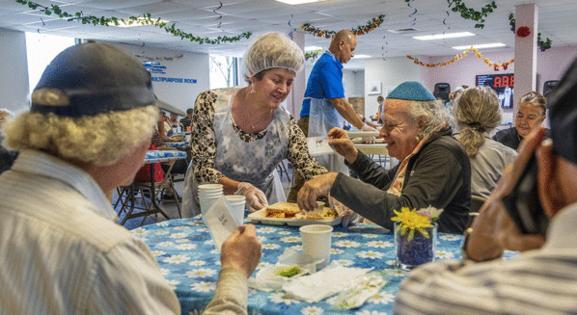
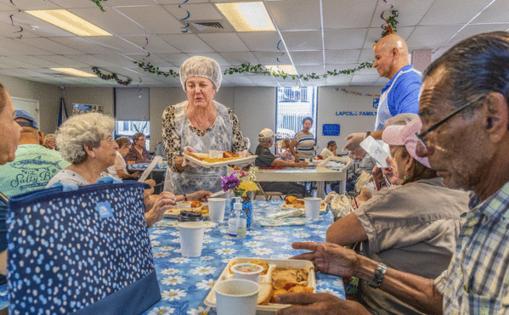
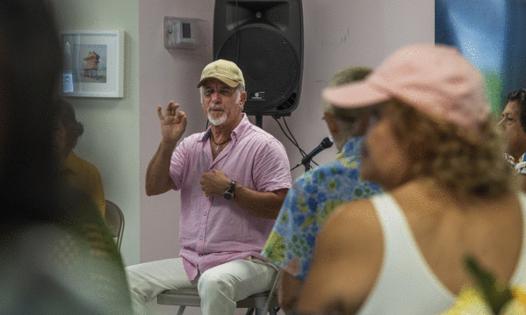
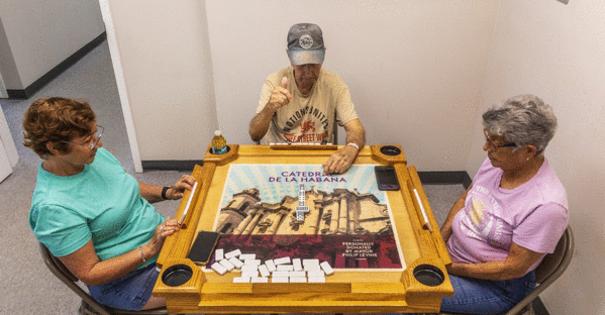
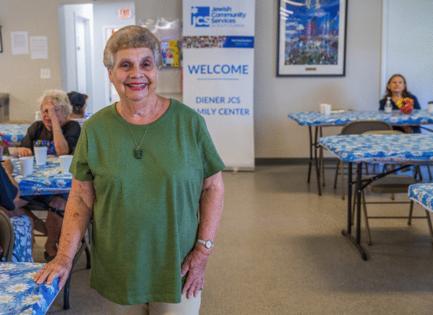











Comments